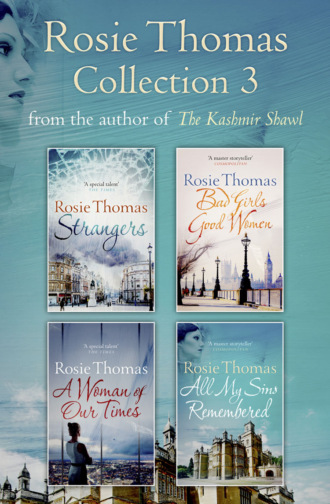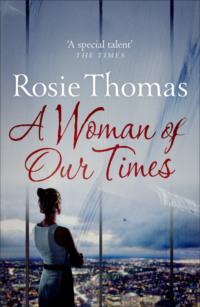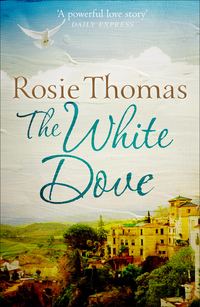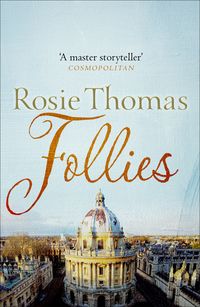
Полная версия
Rosie Thomas 4-Book Collection: Strangers, Bad Girls Good Women, A Woman of Our Times, All My Sins Remembered
She repeated, ‘Yes,’ and then, suddenly, ‘What have you done?’
There was quiet again after that, and she heard something moving, close to her. Her skin crept in a cold wave.
‘I didn’t do it.’ The voice sounded even closer now. ‘It must have been a bomb, I think. Perhaps a gas explosion.’
A bomb.
In her mind’s eye, imprinted on the terrifying darkness, the word conjured up flickering images. There were the television news pictures of violent death amongst the rubble, a half-forgotten impression of the reddened dome of St Paul’s still standing amongst the devastation of the Blitz, and then the mushroom cloud over Hiroshima.
A bomb.
The images faded and left her in the dark again. Her eyes stung with the effort of staring into it. She understood that a bomb had gone off, and buried her along with the broken Christmas tree balls, the gaudy strands of tinsel and the heavy door she had been going to push open. It was the same door lying on top of her now, crushing her.
Annie was shivering violently.
‘I’m afraid,’ she said.
She sounded very shocked, the man thought. But she was conscious, and she had stopped screaming. He wondered if there was a chance of manoeuvring himself close enough to help. He eased himself sideways a little, reaching out with his right hand.
‘What are you doing?’ Her voice was sharp with the onset of panic.
‘Trying to reach you. Listen to me, carefully. Where are you hurt?’
He could almost hear her thinking, painfully exploring the inner contours of her body, just as he had done himself.
At last she said, ‘I can’t feel my legs. My side hurts. There’s something heavy on top of me. I think it’s a door.’
‘That’s good. It’s probably like a shield for you.’
‘And my hair’s caught. I can’t move my head.’
She had long, thick fair hair. He remembered seeing it as she walked to the exit in front of him.
‘Can you move any part of you?’ he persisted.
‘My arm. My left arm.’
Gently, he said, ‘Reach out with it, then.’
He heard a tiny clink, perhaps the buckle of her watch against broken masonry, and the soft scraping of her fingers as they moved towards him. He stretched his own arm, further, until the muscles ached, and the splinters scraped his wrist. And then, miraculously, their fingers touched. Their hands gripped, palm to palm, suddenly strong.
Annie thought, Thank God. The hand in the dark was so solid, the feel of it gripping hers almost familiar, as if she already knew the shape of it.
The man heard the sob of relief in her throat. Her hand felt very cold in his.
‘What’s your name?’ he asked into the blackness.
‘Annie.’
‘Annie. I’ve always liked the name Annie. Mine is Steve.’
‘Steve.’
It was a reassurance to repeat the names, an affirmation that they were still there, still themselves after the cataclysm.
Annie felt his thumb move on the back of her hand, a little stroking movement. The fear began to loosen its grip, and her breath came easier. She turned her head towards him, as far as she could. Her hair pulled at her scalp.
‘I thought you did it,’ she said. ‘I’m sorry. I was afraid of you.’
‘I didn’t do it. I was just doing my Christmas shopping, like you.’
Christmas shopping … the translucent glass balls that had been so expensive, the shiny ribbons and fir branches in the shop windows, the snow falling in the wintry streets. And now? To be buried, in this acrid darkness. How far down? She had the impression that she had fallen down and down, into a great pit. What was balanced above them, how many tons of rubble cutting them off from the sky and air?
Annie’s hair tore at the roots as she struggled, involuntarily.
‘Keep still.’ Steve’s fingers tightened over hers.
Annie heard the door creak over her face. Yes, she must keep still.
‘And you?’ she asked. ‘Are you hurt?’
‘I’m cut, here and there. Not badly. My leg’s the worst. I think it’s broken.’
Now Annie’s fingers moved, trying to lace hers between his.
‘Don’t let go,’ Steve said quickly.
‘I won’t. I’m trying to think. How can we get out?’ She was collecting herself now, trying hard to keep her voice level.
‘I … don’t think we can.’ The sound of the sirens came again, multiplying, but a long way off. ‘They’ll come for us, Annie. It won’t be long, if we can just hold on.’
Annie thought, They won’t find us. How can they? No one even knows I’m here. I didn’t tell Martin where I was going.
‘Who is Martin?’
It was only with the question that Annie realized she had been thinking aloud. All her senses were dislocated. She was looking, staring so hard that her eyes stung, but she couldn’t see. There were noises all around her now, not just the sirens but other, rumbling sounds, creaking, and the rattle of falling fragments. Yet she couldn’t tell whether they were real, or replaying themselves inside her head, like her own voice. And suddenly she had the feeling that she wasn’t trapped at all, but falling again, spreadeagled in the blackness. Annie clenched her fists and tilted her face upwards, deliberately, ignoring the pain in her head, until her cheek met the solid, cold, weighty smoothness of the door.
‘My husband,’ she said, willing the words to come out normally. She wasn’t falling any more. ‘Martin is my husband.’
‘Go on,’ Steve said. ‘Talk to me. It doesn’t matter what. Lie still, and just talk.’
Leaving home this morning. There were the three of them, watching her go, little Benjy in Martin’s arms and Tom swinging around the banister post. Before that, she had run to the top of the stairs, reaching up to brush her cheek against Martin’s. A goodbye like a thousand others, hurried, and she hadn’t even seen her husband’s face. It was so familiar, rubbed smooth in her mind’s eye by the years.
Suddenly, Annie felt her solitude. She was going to die, here, alone. But the hand holding hers was blessedly warm. Where had Martin gone, then?
I love you. They repeated the formula often enough, not out of passion but to reassure each other, renewing the pledge. It is true, Annie thought. I do love him.
Yet now, trying to summon it up in pain and fear, she couldn’t see her husband’s face.
In its place she saw the garden behind their house, as vividly as if she was standing in the back doorway. Only a week ago. Martin was stooping with his back to her, his head half-turned, reaching for the hammer he had dropped on the crazy-paving path. She saw his hand, the torn cuff of the old jacket he wore for gardening, and heard the music coming from the kitchen radio.
They were working in the garden together. Martin had at last found time to repair the larchlap fencing that separated them from their neighbour’s voracious Alsatian. The boys had gone to a birthday party and they were alone, a rare two-hour interval of peace.
Annie was standing at the edge of the flower bed. The dead brown stalks of the summer’s anemones poked up beside her, acid with the smell of tomcats, and the earth itself was black and frost-hard. Her arms ached because she was holding up a bowed length of fencing, waiting for Martin to nail it in place. Neither of them spoke. Annie was cold, and Martin was irritable because he was an awkward handyman and the setbacks in the task had brought him close to losing his temper. He picked up the hammer and jabbed it at the nail, and the nail bent sideways. Martin swore and flung the hammer down again.
Annie was thinking back to the days when they had first bought the crumbling Victorian house, long before Tom was born. They had worked endless weekends, painting and hammering, because they couldn’t afford to employ builders or decorators. They would quarrel unrestrainedly then, launching themselves into blazing arguments over the coving that had been mitred wrong, the glaringly mistaken shade of paint, the tiled edge that rippled like waves on a lagoon. And then they would stop, and laugh about it, and they would go upstairs and make love in the bedroom where the last occupants’ purple and orange wallpaper hung down in ragged strips over their heads. Nine, ten years ago.
A similar memory must have touched Martin too. He had kicked the hammer aside and straightened up to look at her.
Annie saw his face now, every line of it. She could have reached up and touched it in the darkness. He looked almost the same as he had when they first met, except for the deeper creases beside his mouth, and his frown.
He had put his arms round her, inside her coat, and kissed her.
‘Let’s ask Audrey to come in tonight, so that we can go and eat at Costa’s.’
They always went to Costa’s. Annie couldn’t remember the last time they had been anywhere else. They shared a plate of hummous, and then they had dolmades and a bottle of retsina. The last time, after their work in the garden a week ago, they had come in late and Martin had taken the babysitter home. Annie had gone on up to bed and she had fallen asleep at once, before he lay down beside her. In the morning Benjy had woken at six, and for the sake of another hour’s peace she had carried him in and put him between them. He had smiled in triumph, with his thumb in his mouth.
Martin had reached out across Benjy to rest his hand regretfully in the hollow of Annie’s waist. They had looked at each other, acknowledging. That was how it was. They were tired, and then there were the children.
Something touched Annie now, colder than the cold that pierced her bones. She was shivering again.
‘We always go to Costa’s,’ she repeated. ‘I don’t know why. Martin likes it.’
‘I know,’ Steve answered her. ‘I know all about that, too.’
‘Why?’ Annie heard herself ask. ‘Are you married?’
The street had been cleared. Out of the first desperate scramble to reach the injured the police had created a kind of order. They had unrolled orange plastic tapes to make a cordon around the store, and inside the circle the rescue workers were at work. The orange fluorescent jackets worn by the police seemed to spill their colour into the grey air, and the firemen’s yellow helmets bobbed up and down as they unloaded their complicated equipment, pulleys and lifting tackle and strange, cumbersome cameras. They moved quickly, with practised efficiency.
Outside the orange line the rescue vehicles were drawn up. The high grey and scarlet walls of the fire engines made a solid wall, and beyond them an ambulance waited, drawn up beside the big white emergency first aid trailer. Another ambulance moved away with the last of the injured from the pavement outside the store. Sixty yards to the south two police constables opened the white tapes of the outer cordon to let it through.
The crowd, swollen with arriving sightseers, had been moved back beyond the fluttering white tapes. One of the uniformed constables at the cordon still carried a loudhailer, to warn back anyone who tried to come closer.
In the centre of a huddle of police cars drawn up between the inner and outer cordons stood an anonymous pale blue van with a domed roof. It was the major incident vehicle from Scotland Yard, and inside it the duty inspector from the local station was handing the direction of the operation over to the commander who had arrived with it. The bomb squad’s equally anonymous control van stood close beside it.
A few yards away, at a special point in the white cordon, the press had already formed a restless knot. The first television news crew had set up, and their reporter was moving along the crowd at the tapes in search of an eye-witness to interview. But he turned away again as a senior police officer and a police press officer emerged from the control van.
‘We don’t have any idea, as yet,’ the policeman told them. ‘The store had only been open for a few minutes, as you know, so the chances are that there were fewer shoppers inside than there would have been later in the morning. We have a list of store personnel and it is being checked now against the survivors we have already reached.’
A dozen more questions were fired at him.
‘No. We do not yet have an accurate figure for the number of casualties, nor will we for some time. The rescue operation has already begun, and it will continue until it is clear that no survivors remain.’
The cold, wet air was alive with the static crackle of police radios.
‘No,’ the officer said. ‘We don’t have any idea yet as to how many people may be buried.’
He turned away with a brusque nod, back towards the control van. At the cordon the press officer read out to the journalists the telephone number of the central casualty bureau set up at Scotland Yard.
Steve knew how it would be. He had been imagining it, using the picture in his mind’s eye to convince himself that they would be rescued. He needed to convince the girl, too, make her believe in the precision of the rescue operation. Her hand was so cold, and he could feel her trembling even in her fingertips.
‘I was married, for a while. Not any more.’
‘Why?’
She wanted him to talk, too. She was reaching out in the same way, wanting to hold on to the sound of his voice. Steve tasted the dust in his throat.
Why? Cass had been waiting for him, that evening. She hadn’t had a booking, and so she had been at home all day. It was very late when he came in, but it was often late. The irony was that that night he really had been working.
‘Had a good time?’ she had asked, without looking up. There was a bottle on the low glass table beside her, almost empty. So she had been drinking. And, as there always was wherever Cass went, there was a litter of other stuff as well. Two or three glossy magazines, a scarlet phial of nail-varnish with a plastic crest to the lid like a stiletto blade, her Sony Walkman with its leads trailing on the floor, a scatter of open cassette packs.
Steve had draped his jacket over the back of a chair and gone into the kitchen to make a cup of coffee.
‘Had a good time?’ she called after him. He had ground the coffee very fine, almost relishing the noise, and then he had gone to the kitchen doorway to look at her.
Cass was a model. She wasn’t quite the youngest in the business now, but she was still successful. Cass’s real name was Jennifer Cassady, but her agency had agreed when they took her on the books that her given name wasn’t quite right. So they had opted simply for ‘Cass’. There was the name, in the agency’s folder, in her portfolio, on her cards. ‘Cass. Hair, brown. Eyes, green. 5ft 10in. 35–24–34.’ And all the rest of the information – her shoe and glove sizes, her particular modelling expertise, her willingness to ‘do’ underwear ads.
Like most of her model friends, Cass rarely wore make-up when she wasn’t working. Her pale, triangular face turned towards Steve, expressionless under its straight-cut fringe of hair. Steve had often thought that with her wide-set eyes and her pointed chin, she looked like a Persian cat. She moved like a cat, too.
‘Not particularly.’ Steve answered her question deliberately slowly. ‘I’ve been doing a reshoot for Fawcetts. I’ve had Phil Day on my back all evening.’
‘That must make a change,’ Cass said, carefully, not wanting to muff her line now that it had been presented to her, ‘from having Vicky on hers.’
Steve hadn’t said anything. There wasn’t any point in saying anything, both of them understood that. He had gone back into the kitchen and rummaged in the drawers for the coffee strainer. He had poured himself a mugful of coffee and leant against the grey-painted cupboard, staring blankly at the newspaper, while he drank it.
When he went back into the living room, Cass wasn’t there. He turned off the lights, went through into the bedroom, and found her.
She had made up her face, and changed out of her sweatshirt and track pants. Steve was used to her chameleon transformations, but now he stood still and stared at her. Later he remembered a black lace bra, French knickers slit high at the sides, suspenders and black stockings. Cass had painted pouting red lips over her own, but her black-rimmed eyes belied them. They met his, full of bewildered resentment. But she faced him squarely with one hand on her hip, posing.
‘I’m sorry you didn’t have a good time tonight. Shall I give you one now?’
‘Cass, for God’s sake …’
She came swaying towards him, reaching up to the catch of her bra but holding it over her breasts, sliding the straps off her smooth brown shoulders.
She was very pretty, tall and a little too thin, with hip-bones that jutted on either side of the soft concavity of her stomach. Against his will, knowing that she was manipulating him, Steve put out his hand to touch her. Her skin was warm, and he knew the intimate scent of it.
‘Cass,’ he whispered. ‘What are you doing?’
‘I am your wife, aren’t I?’
‘You are.’
He drew her to him and her half-naked body fitted against his. He kissed her, smudging the scarlet mouth, and she began to undo the buttons of his shirt. Steve tilted her sideways, down on to the bed. For a moment she lay looking up at him, then she rolled over so that she was on top. She undid the last button and her fingers moved to the buckle of his belt. She bent her head to kiss him and then looked downwards, dreamily, the soft ends of her hair trailing over his bare chest. For the moment Steve had forgotten the complicated sequence of their long-running battle. His fingers found the lace-trimmed edge of the provocative knickers. He slid them inside, reaching for her.
Cass pushed him away. She rolled out his arms and stood up. Without a glance back at him she went to her wardrobe, took out a coat and put it on over the black lace underthings. Then she lifted down a suitcase, opened a drawer and began to stuff clothes into it.
‘What in God’s name are you doing?’ Steve felt the heat of his anger fuelled by desire.
Cass didn’t look round. She put an armful of clothes on hangers into the case and slammed it shut.
‘I’m leaving you,’ she said flatly. ‘I hate you. You disgust me.’
‘Don’t be so bloody stupid.’
He had lifted himself up on to his elbows to look at her, and he felt his awkward heat, the frustrated redness of his face. His anger intensified. Cass put her feet into a pair of suede boots. She swept a clutter of things, keys and her chequebook and her precious Filofax, off the bedside table and into her bag.
She went to the door and then, finally, turned back to look at him.
‘Goodbye, Steve,’ she said. She hadn’t been able to resist the final pose.
‘Where the hell are you going?’
‘Nowhere that concerns you.’
His wife walked out, closing the door behind her.
Steve lay motionless for a moment, and then he flung himself off the bed and went to the window. He tucked his shirt back into his trousers and opened the curtain. He saw Cass come out into the street and put her suitcase into her car. It was a little gold-coloured Renault 5, and Steve remembered that he had booked it in for a service later in the week. Cass revved the engine, backed the car up and then shot forwards. He stood at the window watching the street for a long time after the Renault had vanished.
She’ll be back, he told himself. It won’t last more than a couple of days. But she had never come back.
‘I’ve never told anyone exactly what happened,’ Steve said. ‘I just said we’d split up. Out of shame, I suppose. But I’m telling you, now.’
‘I don’t think shame matters very much,’ the girl said quietly, ‘if you’re going to die.’
Annie heard his quick movement, and then his breath catch as pain gripped him somewhere.
‘We aren’t going to die,’ he said. ‘Do you hear?’ And then, when there was no answer, ‘Say something, Annie. We aren’t going to die. They’ll dig us out of here. I know they will.’
‘They’ll dig us out,’ she echoed him, at last. They lay still, their hands clasped.
Annie hated the quiet seeping around them. It seemed to be only a superficial quiet, masking all kind of noises, perhaps the first rumble of the avalanche that would bring the weight of rubble down to crush their precarious shelter.
‘Do you want her to come back?’ she asked quickly.
‘I don’t know. No, I don’t think so.’
Not any more. He still saw Vicky, and one or two others just like her. He worked very hard – it was his own production company, and he had to – and when there was no Vicky or anyone else he came home to the empty flat.
‘You sound sorry for yourself.’
Her words made him look into the blank darkness, wishing he could see her. He had had only the vaguest impression of her turning away from the counter and walking ahead of him towards the door. She had a pleasant, preoccupied face. Ordinary.
‘And you sound like a schoolmistress.’
She did. There was a faint bossiness, a moral certainty. No, it wasn’t a schoolmistress – it was a mother, used to delivering crisp reprimands. Steve heard something that might almost have been a low, painful laugh.
‘Don’t you think it’s odd that we’re buried here, holding hands and insulting each other?’ the girl asked.
His answering smile flickered automatically before the pain in his leg made him wince again.
‘I like the spirit, Annie,’ he said. ‘Nothing’s odd, down here, is it? Say what you like. Talk to me some more. Tell me, are you happily married?’
What was the cold hand that had touched her, when she remembered the day in the garden? It came again now, tightening its hold, and she was already so cold. The shivering took hold of her and she went stiff, trying to stop it because it shook the pain deeper into her side, like a knife stabbing her.
‘Yes. Yes, we’re happy together. I am. I think Martin is.’ She could hear herself gabbling and she made herself talk more slowly, shaping the words in her mouth before she uttered them.
Years, succeeding one another. Changing their texture a little, the colours fading from bright to dim, but all woven in the same, even way.
‘I’m just a housewife. I’ve got two children, boys, eight and three.’
Oh, Thomas, Benjy, I love you so much. Don’t let me die here without seeing you.
‘My husband’s a designer, interiors. His company does shops, that kind of thing. I used to do similar work, before Tom was born. Now I look after the children and Martin, and the house. I’m happy doing it. You can’t imagine what it would be like, can you?’
I know you now, Steve thought. I’ve seen you, all of you, in the park with your kids, or struggling to get off the tube with one in a buggy and the other hanging on to your coat.
‘Cass wanted to be like that, I think. For all her wild outfits and dotty behaviour. I think she really wanted to have dinner ready every evening at eight o’clock, get the holiday brochures in January and make plans for July, have a regular night out together every week.’
‘And you didn’t?
‘No, I didn’t. It was the routine of being married that I couldn’t bear.’
‘Like always going to Costa’s,’ Annie said.
‘I don’t always want dolmades. I like to see different things on the menu. I like to eat in different restaurants.’
She listened carefully to the sound of his words, and felt his hand holding hers. His hand was large, and still quite warm. Annie felt suddenly irrationally angry. ‘I think you sound a bit of a pig.’
Steve did laugh this time, a spluttering cough of laughter. ‘But I’m a pig who survives. And you’ll survive too, my love. I’ll make you.’
Annie’s anger went away as quickly as it had come. Hearing his conviction, a man she had never seen, she believed him. It was important to believe, she understood that too.
‘How long have we been here?’ Her voice sounded childlike now. ‘How long will it be before they come?’
‘We might have been here an hour. Perhaps not even as long as that. Does your watch have hands?’
‘Hands?’ Annie could only think of their own, linked together.









